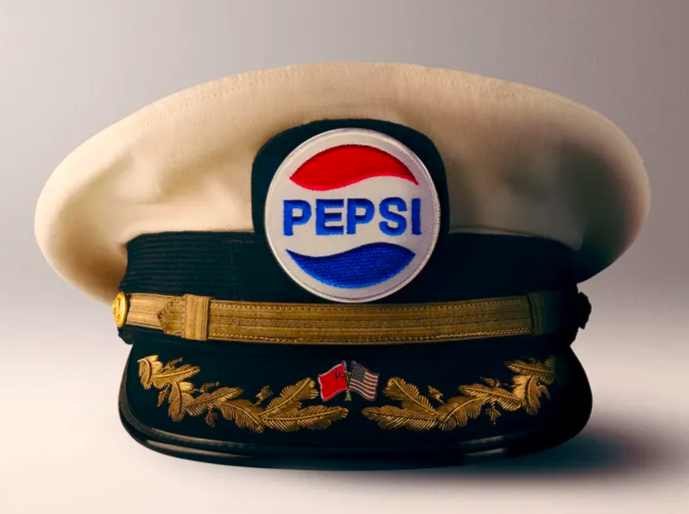SAILING WITH PEPSI’S NAVY AND SUNDAYS FOR POETRY
Vol. 1, No. 12
In this issue of the Reader, your always vigilant correspondent writes about how the makers of Pepsi-Cola were purported to be a global naval power, how writing Sunday poetry became a thing, and observations of a two-forked poplar tree.
This week: a 5-minute read

THE TRUE TALE OF THE PEPSI NAVY
There is this story that’s been making the rounds of the Internet for, well, about as long as there’s been an Internet. It involves the goings-on in the final days of the Soviet Union. More specifically, the story is about how the U.S. company Pepsico, the corporation that makes Pepsi-Cola, assorted other beverages, and Doritos, bought the remnants of the Soviet Navy. It meant that, for a time anyway, Pepsi had one of the largest navies in the world.
Well, like all good stories, there is a thread of truth to it, but most of it is horse hockey. To wit:
In 1989, Pepsico did indeed acquire 17 submarines, a cruiser, a frigate and a destroyer from the Soviet Union, thereby taking title to the sixth-largest fleet in the world. What a delightful end to the Cold War, folks surmised, providing a victory lap for American free enterprise and a just comeuppance for those nasty commies.
Sigh. Not quite. According to ForeignPolicy.com, the ships Pepsi acquired were small, old, obsolete and unseaworthy. The Pepsi navy could no more assume its place as a global naval power than an old Motel T could become a contender on the Formula One racing circuit. The ships were immediately turned over to a Norwegian shipyard to be scrapped.
Still, the story of the Pepsi navy lends itself nicely to an era of genuine chaos in Russia as the country went broke, the economy crumbled and oligarchs plundered industrial and military stockpiles. Yet the deal was made before all that happened. Why do it? Pepsi was looking to lock in continued access to the Soviet market and in exchange agreed to take the Russians’ old boats off their hands. In the end, though, the Soviet empire collapsed and an Internet tale was born.
HISTORY IS UNKIND
“Under Lenin, the Soviet Union was like a religious revival, under Stalin like a prison, under Khrushchev like a circus, and under Brezhnev like the U.S. Post Office.” — U.S. National Security Advisor Zbigniew Brzeziński in 1977
FROM THE MAILBAG
Re ‘Dressing By Any Other Connotation,’ Oct. 13. Terry, thank you for the amusing anecdote about that long ago Thanksgiving dinner. While I don’t remember the conversation, I can easily imagine the place and time. To be fair to your eight-year-old self, if I had used another word like “stuffing” there might have been less confusion. Or maybe it would have gone in another amusing direction. Ross Gill, Waterloo, Ontario
Re ‘And This,’ Oct. 13. Crapulence: l always thought that word related to events of the next day. Ya learn something new every day. Dick Wood, LaSalle, Ontario
Terry, I look forward to your Sunday newsletters. Sue Prestedge, Hamilton, Ontario
Always an enjoyable read, Terry. Thank you. Gail Buick, Stouffville, Ontario
Re ‘Connie’s Story Was Mine,’ Oct. 6. Great story, Terry. I especially loved the time you spent with your dad in the front seat. Adèle Fontaine, Edmonton, Alberta
If you want to drop me a note (and risk me publishing it here), just reply to this email or, if you prefer send it to mysundayreader@gmail.com.

SPEAKING OF ADÈLE
Adèle Fontaine, a long-time resident of the Edmonton neighbourhood of Riverdale, is not only an astute reader and occasional contributor to the Mailbag, she is a poet of some repute. Also, she is consistent and amazingly reliable in her rhythmic output.
Adèle emails me a poem every Sunday. She sends it to a lot of folks every Sunday. She’s been writing poems every Sunday for 10 years, every Sunday since her husband Normand died.
She started her poetry as a way to help cope with her grief over her loss of a husband who was a well-known Alberta broadcaster. Adèle and Normand were married for 53 years and raised seven children. Writing poetry, she told CBC Radio’s Edmonton AM a few years back, was her way to stay connected with him, to in her words, continue their conversation.
“Often I would get up in the morning, quickly make a coffee, forget to drink it and just sit there and write this poem,” she told the CBC.
She never wrote much poetry before Normand died but hasn’t stopped since. This is the poem she sent me last Sunday, written during a visit to Moncton, New Brunswick.
A giant poplar stands at the front door
On 79 Dufferin Street in Moncton
It is more that remarkable
Because it has diverged
Into two v-shaped forks
A more than auspicious tree
It carries the essence
Of a two-spirited being
You can call it what you want
But if you look carefully
You will see how it has thrived
And become more than ordinary
A magnificent being
Whose presence demands
Undivided attention
To its uniqueness
And yet how many of us
Will walk by
Much too busy to stop
And notice
How this tree
Has become effortlessly original.
A collection of Adèle’s works have been published in her book My Sundays with Normand.
THIS WEEK’S SHAMELESS PLUG
Last week we published a review of our book Lethbridge: A Tale of Love in a Time of War by former Vancouver Province and Windsor Star editor Wayne Moriarty. This week’s review was penned by Tony Richards of Puerto Escondido, Mexico, and the former publisher of the Gulf Islands Driftwood on Salt Spring Island, B.C. It’s included on our website Lethbridgetale.com. Please check it out.
I don't often write book reviews and just as rarely do I give a book five stars. It's got to be a standout. Terry McConnell's Lethbridge is just that and one of the best stories I've read in a long time.
It's a fascinating tale inspired by the author's own family history and how it all came together in Lethbridge, Alberta. An important part of the book is the lead-up to the Canadian army's seizure of Vimy Ridge in 1917, leaving me surprised at how little I really know about a significant event in Canadian history.
But that was just one element of many that kept me engaged from beginning to end. At one point I wondered if there might be a sequel. I didn't want such a good story to come to an end.
Remember, you may be eligible for free shipping on our special October bundle, Lethbridge and Cabbage Brain.

AND FINALLY …
If you enjoy My Sunday Reader, please forward it to a friend. See ya next Sunday. / T.
© Terry McConnell, 2024
